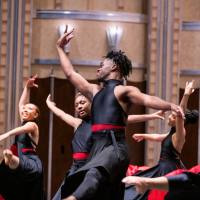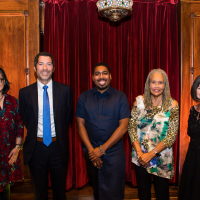“Artists are often out in front of the words,” said Anna Deavere Smith in her keynote address cum performance at the Creative Voices Summit at Cleveland State University this week. “How do we deal with this in school, where it’s all about the words, the sentences, the specifics?” she challenged the room full of educators.
How, indeed?
Ms. Deavere Smith is a remarkable artist/teacher/performer, a MacArthur fellow, the Ford Foundation’s first artist-in-residence, and the founder of the Institute on the Arts and Civic Dialogue, among many other accomplishments. You may know her as “the first black national security advisor,” as she calls her role on “The West Wing,” but if you don’t know her as a performance artist, you don’t know her.
Her presentation here introduced the intention behind her work as a “Theater of Kindness and Grace,” presenting us with representations of four individuals in their own words. The idea was to illustrate how art and creative expression have an important role in setting the stage, as it were, for the words we struggle to find to express our humanity or society’s inhumanity.
I do not have the time – nor the skill – to give you a satisfactory review of her presentation, so I will not try. But I urge you to spend 20 minutes with her via the link above. I will only leave a trail of thoughts that are my impressions from her talk. I will need to sit with them for quite a while in order to feel their full effect:
- Four things eliminated from the public school day in the past 40 years: arts, physical education, good nutrition, civics. What have been the ramifications of these losses? The inability of children to understand metaphor, express empathy with the other and use their imaginations. The growing problem of childhood obesity and diabetes (being addressed, according to Ms. Smith, now that white children are suffering, although the medical profession noted the problem with poor black children in the 1980’s). The loss of shared historical perspective and the sense of civic duty.
- There is a difference between optimism and hope. Optimism believes things will get better. Hope accepts that things are bad but makes a leap of faith.
- We need to “linger long” with what is difficult – even intolerable – in order to understand. Tolerance for the uncomfortable creates empathy. We need art as a way to express despair. Art creates visions that become contagious, leading to action and change.
- Do we allow the time for art to “linger long” on opportunities for deeply personal expression in the school day, or are we on “clock time?”
- If you say a word often enough, it becomes you. What does this mean for the common use of negative and profane language among youth? What might it mean if aspirational language became the norm?

